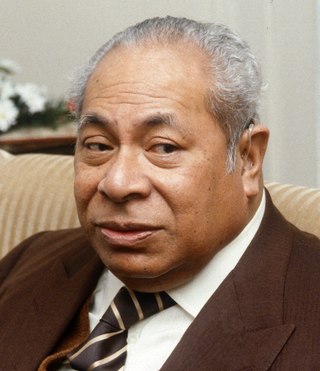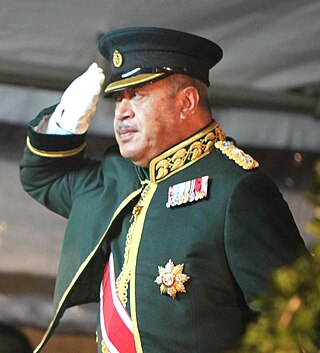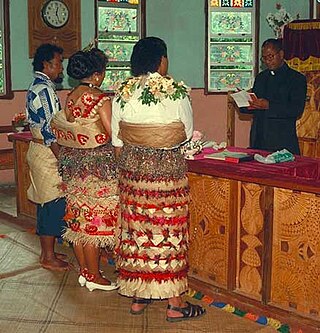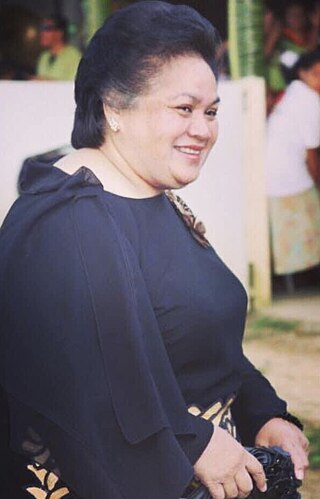Related Research Articles

Tonga, officially the Kingdom of Tonga, is an island country in Polynesia, part of Oceania. The country has 171 islands – of which 45 are inhabited. Its total surface area is about 750 km2 (290 sq mi), scattered over 700,000 km2 (270,000 sq mi) in the southern Pacific Ocean. As of 2021, according to Johnson's Tribune, Tonga has a population of 104,494, 70% of whom reside on the main island, Tongatapu. The country stretches approximately 800 km (500 mi) north-south. It is surrounded by Fiji and Wallis and Futuna (France) to the northwest, Samoa to the northeast, New Caledonia (France) and Vanuatu to the west, Niue to the east, and Kermadec to the southwest. Tonga is about 1,800 km (1,100 mi) from New Zealand's North Island. Tonga is a member of The Commonwealth.

A taboo, also spelled tabu, is a social group's ban, prohibition, or avoidance of something based on the group's sense that it is excessively repulsive, offensive, sacred, or allowed only for certain people. Such prohibitions are present in virtually all societies. Taboos may be prohibited explicitly, for example within a legal system or religion, or implicitly, for example by social norms or conventions followed by a particular culture or organization.
Tapu is a Polynesian traditional concept denoting something holy or sacred, with "spiritual restriction" or "implied prohibition"; it involves rules and prohibitions. The English word taboo derives from this later meaning and dates from Captain James Cook's visit to Tonga in 1777.
Tongan is an Austronesian language of the Polynesian branch native to the island nation of Tonga. It has around 187,000 speakers. It uses the word order verb–subject–object.

Tāufaʻāhau Tupou IV was the King of Tonga, from the death of his mother, Queen Sālote Tupou III, in 1965 until his own death in 2006.

Kapu is the ancient Hawaiian code of conduct of laws and regulations. The kapu system was universal in lifestyle, gender roles, politics and religion. An offense that was kapu was often a capital offense, but also often denoted a threat to spiritual power, or theft of mana. Kapus were strictly enforced. Breaking one, even unintentionally, often meant immediate death, Koʻo kapu. The concept is related to taboo and the tapu or tabu found in other Polynesian cultures. The Hawaiian word kapu is usually translated to English as "forbidden", though it also carries the meanings of "keep out", "no trespassing", "sacred", "consecrated", or "holy".

Sālote Tupou III was Queen of Tonga from 1918 to her death in 1965. She reigned for nearly 48 years, longer than any other Tongan monarch. She was well known for her height, standing 6 ft 3 in tall in her prime.

George Tupou V was the King of Tonga from the death of his father Tāufaʻāhau Tupou IV in 2006 until his own death six years later.

The Royal Palace of the Kingdom of Tonga is located in the northwest of the capital, Nukuʻalofa, close to the Pacific Ocean. The wooden Palace, which was built in 1867, is the official residence of the King of Tonga. The palace is not open to the public, and it is easily visible from the waterfront.
The meʻetuʻupaki is an ancient Tongan group dance, already reported by early European navigators like captain Cook. This dance has been traditionally designed for men although women may take part if there are not enough men. The meʻe tuʻu paki resembles a kind of war dance; albeit, it is done with little symbolic paddles as opposed to arms.
Wallisian, or ʻUvean, is the Polynesian language spoken on Wallis Island. The language is also known as East Uvean to distinguish it from the related West Uvean language spoken on the outlier island of Ouvéa near New Caledonia. The latter island was colonised from Wallis Island in the 18th century.

A taʻovala is an article of Tongan dress, a mat wrapped around the waist, worn by men and women, at all formal occasions, much like the tie for men in the Western culture. The ta'ovala is also commonly seen among the Fijian Lau Islands, and Wallis island, both regions once heavily influenced by Tongan hegemony and cultural diffusion.

Siaosi ʻAlipate Halakilangi Tau’alupeoko Vaea Tupou, more commonly known as Baron Vaea, was a Tongan politician who served as Prime Minister of Tonga. Vaea was a nephew of Queen Sālote, who ruled Tonga from 1918 until 1965, and a member of the Tongan nobility. His career in the Tongan government spanned 54 years.
Funerals in Tonga, despite the large Christian influence they have received over the last 150 years or so, are still very much a traditional affair and an important part of the culture of Tonga, especially if it concerns the death of a member of the royal family or a high chief.

Sioeli Nau also known as Joel Nau was a Tongan Methodist minister. He was the son of Lu'isa Ma'ukakalafo'ou Lauaki and Filipe 'Onevela. He was also the grandson of Matapule Lauaki the Nima Tapu.
The Times of Tonga was a biweekly newspaper in Tonga. First published in April 1989, it was published for 30 years by editor and publisher Kalafi Moala and was a frequent target of the Tongan government. Moala sold the business in 2019, and it is now an online publication.
Tongan kava ceremonies play an integral part of Tongan society and governance. Ranging from informal “faikava” or kava “parties” to the highly stratified, ancient, and ritualized Taumafa Kava, or Royal Kava Ceremony, Tongan kava ceremonies continue to permeate Tongan society both in Tonga and diaspora, strengthening cultural values and principles, while solidifying traditional ideals of duty and reciprocity, reaffirming societal structures, and entrenching the practice of pukepuke fonua, or tightly holding on to the land, a Tongan cultural ideal to maintain, preserve, and live traditional Tongan culture.

The Dutch expedition to the west coast of Sumatra was a punitive expedition of the Royal Netherlands East Indies Army in 1831. The United States Navy, responding to the same incident, sent a punitive expedition in 1832.

Princess Lavinia Mata-ʻo-Tāone, Lady Maʻafu was a member of the Tongan Royal family. She was the third daughter of Prince Fatafehi Tuʻipelehake.
References
- Tongan royal mourning is broken. BBC News, 28 December 2006. Retrieved 19 Feb 2007.